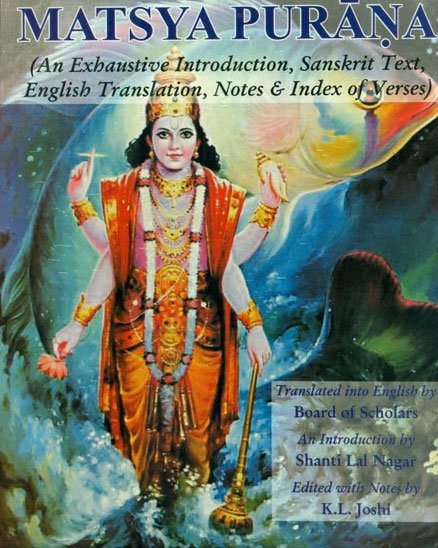The Matsya Purana (critical study)
by Kushal Kalita | 2018 | 74,766 words | ISBN-13: 9788171103058
This page relates ‘Yadava Dynasty’ of the English study on the Matsya-purana: a Sanskrit text preserving ancient Indian traditions and legends written in over 14,000 metrical verses. In this study, the background and content of the Matsyapurana is outlined against the cultural history of ancient India in terms of religion, politics, geography and architectural aspects. It shows how the encyclopedic character causes the text to deal with almost all the aspects of human civilization.
Part 2.1d - The Yādava Dynasty
King Yadu had five sons named Sahasrajit, Kroṣṭu, Nīla, Antika, and Laghu.[1] Sahasrajit and Kroṣṭu were the most prominent. Sahasrajit was blessed by a son Śatajit.[2] He had three sons Haihaya, Haya and Venuhaya.[3] The descendants of Haihaya were named after his name as Haihayas. On the other hand the descendents of Kroṣṭu were known as the Yādavas.
The genealogy of Yādavas that descended from Kroṣṭu, son of Yadu is discussed broadly in the Matsyapurāṇa. According to F. E. Pargiter, genealogy of Yādavas from Kroṣṭu can be divided in to two parts.[4] One is from Kroṣṭu to Sāttvata and another one is the remaining part. King Kroṣṭu had a son named Vṛjinīvāna.[5] Vṛjinīvāna became the father of Svāhā.[6] Ruṣaṅgu was the son of Svāhā.[7] Ruṣaṅgu was succeeded by his son Saumya. The latter was the father of Citra and Citraratha.[8] Śaśavindu, the son of Citraratha became the World Emperor.[9] Śaśavindu had one hundred (100) sons. From the one hundred (100) sons he begot one hundred (100) grandsons.[10] Pṛthuśravā, Pṛthuyaśā, Pṛthudharmā, Pṛthuñjaya, Pṛthukīrti and Pṛthumanā were the most well-known among them. Pṛthuśravā had a son by name Sūyajña. Sūyajña begot a son Uśanā. Uśanā had a son named Titikṣu who was known as the destroyer of enemies.[11] Titikṣu begot a son named Marutta.[12] Kambalabarhiṣa was the son of Marutta. Kambalabarhiṣa was the father of Rukmakavaca.[13] Rukmakavaca was blessed with five sons, viz., Rukmeṣu, Pṛthurukma, Jyāmagha, Parigha, Hari. Among these sons Rukmeṣu succeeded to the throne of his father. Parigha and Hari were given responsibility to rule over the Videha country.[14] Initially Jyāmagha had taken sanyāsa.[15] But after some period he gave up sanyāsa dharma and on the bank of Narmadā he set up his own country. He had a son named Vidarbha from his wife Caitrā. [16]
Vidarbha from his wife begot three princes, viz., Kratha, Kaiśika and Lomapāda.[17] Kratha had a son named Kuntī, who was the father of Dhṛṣṭa. Dhṛṣṭa had a son named Nirvṛti,[18] who was the father of Viduratha. Viduratha was the father of Dāśāha, Dāśāha of Vyoma, Vyoma of Jīmuta, Jīmuta of Vimala, Vimala of Bhīmaratha, Bhīmaratha of Navaratha, Navaratha of Dṛḍharatha, Drḍharatha of Śakuni, Śakuni of Kārambha, Kārambha of Devaratha, Devaratha of Devakṣatra. Devakṣatra was the father of Madhu.[19] Madhu founded a kingdom on the right bank of river Yamunā in Brajabhūmi which was named after him as Madhupura.[20] Later it was known as Mathurā. He begot a son named Puravasa. The later was the father of Purudvān. Purudvān had a son named Jantu. Jantu from his wife Aikṣvaki begot a son named Sātvata. Sātvata was the fifth successor of Madhu. The successors of Sātvata were also known as the Sātvatas.[21] Sātvatas’s sons were Bhajin, Bhajamāna, Divya, Devāvṛddha, Andhaka, Mahābhoja, Vṛṣñi etc. Bhajamāna had many sons viz., Nimi, Kṛmila, Parapurañjaya from his two wives Sṛnjayī and Vāhyaka. Devāvṛddha had a son by name Vabhru.[22]
Footnotes and references:
[1]:
Ibid., 43.6-7
[2]:
,43.7
[3]:
,43.8
[4]:
F. E. Pargiter, Ancient Indian historical Tradition, p.102
[5]:
Matsyapurāṇa, 44.15
[6]:
Ibid., 44.16
[7]:
Ibid.,44.16
[8]:
Ibid.,44.17
[9]:
Ibid.,44.18
[10]:
Ibid., 44.19-20
[11]:
Ibid., 44.24
[12]:
Ibid., 44.24
[13]:
Ibid.,44.26
[14]:
Ibid.,44.29
[15]:
Ibid., 44.30
[16]:
Ibid.,41.31-36
[17]:
Ibid., 44.35-36
[18]:
Ibid., 44.39
[19]:
Ibid., 44.39-43
[20]:
Ibid.,44.44
[21]:
Ibid.,44.46
[22]:
Ibid.,44.51
